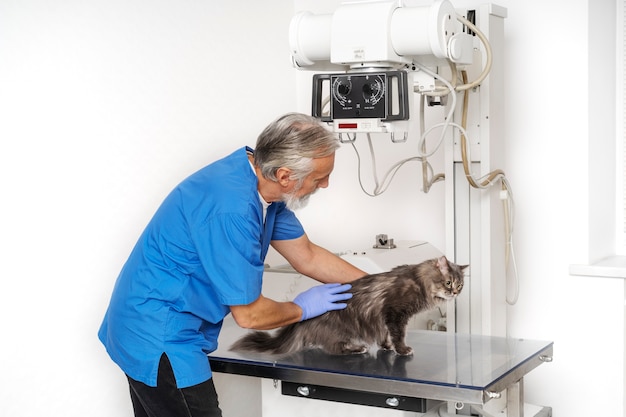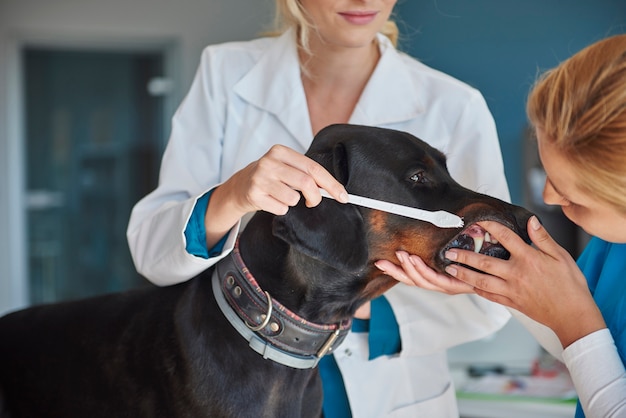Pet Dental Radiography: Detecting Oral Issues Early


Pet Dental Radiography: Detecting Oral Issues Early
At Pets Ahoy Animal Hospital, pet owners in Macomb and surrounding communities trust our veterinary team to deliver comprehensive and compassionate care. One of the most important yet often overlooked aspects of pet health is oral care. Many dental problems in dogs and cats remain hidden beneath the gumline, invisible during a standard examination. This is where pet dental radiography becomes an invaluable tool. Dental x-rays for pets allow veterinarians to uncover oral issues before they become painful or cause long-term harm.
In this blog, we’ll explore what pet dental radiography is, why it’s crucial for early detection of dental problems, how it benefits both dogs and cats, and what you can expect when your pet receives dental x-rays at our Macomb location. We’ll also provide guidance on how to recognize dental issues at home, when to seek veterinary care, and how preventive dentistry supports your pet’s well-being. If you’ve ever searched for a “dental vet near me” or wondered about the best way to keep your pet’s mouth healthy, you’re in the right place. For those interested in more details about this technology, you can visit our dedicated page on dental radiography services for pets at Pets Ahoy Animal Hospital.
Recognizing the Signs: When Might Your Pet Need Dental X-Rays?
Many pet owners wonder how to tell if their dog or cat might benefit from dental x-rays. Often, the signs of dental disease are subtle or easy to miss in the early stages. Key symptoms include bad breath that persists even after dental cleanings, visible tartar or discoloration on the teeth, and swelling around the mouth or jaw. Additionally, some pets may experience difficulty eating, drop food from their mouths, or show a preference for softer foods. Other signs to watch for are pawing at the face, changes in chewing behavior, or sensitivity when their mouth is touched.
It’s important to remember that some dental problems are completely hidden below the gumline. Conditions such as root infections, tooth resorption, and bone loss can progress without any outward symptoms. For this reason, routine dental examinations and dental x-rays for pets are essential for detecting these problems early. In Macomb, pet dental radiography helps our veterinarians identify issues that would otherwise remain undiagnosed until they cause significant pain or complications.
Subtle Clues: Why Early Detection is a Challenge
Unlike humans, most pets do not show obvious signs of oral pain until dental disease is advanced. A dog may continue to play and eat normally while suffering from an abscessed tooth, or a cat might only show a slight change in grooming habits. Early detection through pet dental radiography offers a window into your pet’s oral health that a visual check alone cannot provide. This is especially important for aging pets or breeds prone to dental issues.
Understanding Pet Dental Radiography: How Hidden Problems Develop
Dental disease in pets is a gradual process that often starts with the accumulation of plaque and tartar on the teeth. Over time, bacteria in the mouth can lead to inflammation of the gums, known as gingivitis, which may progress to periodontal disease. Factors contributing to dental problems include genetics, diet, lack of regular dental care, and even the anatomy of certain breeds. Small breed dogs and some cats are especially susceptible to tooth resorption and bone loss.
Pet dental radiography in Macomb allows our veterinary team to see beneath the surface of the teeth and gums. By using advanced imaging technology, we can detect root infections, fractured teeth, retained baby teeth, cysts, tumors, and changes in bone structure. Dental x-rays for pets are particularly important before performing any dental surgery or tooth extractions, as they guide the safest and most effective treatment plan.
Why Visual Exams Alone Aren’t Enough
While a physical examination of your pet’s mouth can reveal tartar, inflammation, and broken teeth, many serious conditions remain hidden. For example, a tooth may appear healthy on the surface but have a diseased or dying root. Only dental radiographs can reveal this kind of problem. That’s why our veterinarians recommend dental x-rays as a routine part of comprehensive dental care—especially when pets show signs of discomfort, have persistent bad breath, or are due for dental cleaning.
Professional Treatment: What Happens During Pet Dental Radiography
When your pet visits Pets Ahoy Animal Hospital for a dental examination, our veterinary professionals will first perform a thorough assessment of their oral health. If dental disease is suspected or if your pet is scheduled for a dental cleaning, we may recommend dental x-rays to get a complete picture of their oral structures.
The process of pet dental radiography involves safely anesthetizing your pet to ensure they remain still and comfortable during the procedure. This is important because pets cannot hold their mouths open or stay motionless like people can. Our team uses specialized digital radiography equipment designed for pets, which minimizes radiation exposure and provides high-resolution images quickly.
Treatment approaches based on dental x-rays can include professional dental cleanings to remove tartar and plaque above and below the gumline, targeted oral surgery for conditions like tooth root abscesses or fractured teeth, and extractions if a tooth is too damaged to save. For more information about how we perform these procedures, visit our page on pet dental cleanings or learn about pet oral surgery, including dental extractions and advanced oral care.
Tailoring the Approach: Personalized Dental Care
Each pet is unique, and our veterinarians develop a personalized dental treatment plan based on your pet’s specific needs, age, and medical history. In some cases, dental x-rays reveal problems before they cause pain, allowing for early intervention and less invasive treatments. Our team will discuss all findings with you and answer any questions, ensuring you feel confident in the care your pet receives.
Preventing Oral Disease: Home Care and Routine Preventive Visits
While pet dental radiography in Macomb is an essential diagnostic tool, prevention always starts at home. Steps to support your pet’s oral health include regular tooth brushing with veterinary-approved toothpaste, providing dental chews or toys designed to reduce plaque, and offering a balanced diet that supports dental health. Additionally, scheduling routine wellness examinations and professional cleanings is key to maintaining your pet’s mouth in top condition.
Our veterinary team recommends that most pets receive a dental checkup at least once a year. For those with a history of dental problems or breeds prone to oral disease, more frequent visits may be necessary. Wellness plans at Pets Ahoy Animal Hospital are designed to make preventive care, including dental assessments, accessible and convenient for families in Macomb and nearby communities. Learn more about our comprehensive wellness plans for pets and how they can help keep your pet healthy year-round.
Practical Steps for Pet Owners
Incorporating dental care into your pet’s routine doesn’t have to be overwhelming. Start by getting your pet used to having their mouth handled, gradually introducing tooth brushing, and rewarding calm behavior. Watch for any changes in eating, drooling, or breath odor, and make note of them to discuss at your next veterinary visit. Remember, early intervention is the best way to avoid more complicated and costly dental issues down the line.
When to Seek Veterinary Care: Don’t Wait for Serious Symptoms
Knowing when to seek professional help is an important part of proactive pet ownership. You should contact your veterinarian if you notice persistent bad breath, visible swelling, bleeding gums, loose or missing teeth, difficulty eating, or sudden behavioral changes such as irritability or withdrawal. Even if your pet seems comfortable, these symptoms may indicate underlying dental problems that require immediate attention.
If you’re searching for a “veterinarian near me” who offers advanced dental x-rays for pets, look no further than Pets Ahoy Animal Hospital in Macomb. Our veterinary professionals are here to provide expert guidance and compassionate care, from routine dental assessments to advanced diagnostic imaging and treatment. Whenever you have concerns about your pet’s oral health, we encourage you to schedule an appointment so we can address issues before they become emergencies.
The Value of Local Expertise
Choosing a veterinary practice that offers pet dental radiography in Macomb ensures your pet benefits from early detection of oral issues and access to advanced care close to home. Our team understands the unique needs of local pets and is committed to supporting their health through every stage of life. By working together, we can help your dog or cat enjoy a pain-free, healthy mouth for years to come.
Take Action for Your Pet’s Oral Health in Macomb
Your pet’s health and happiness start with a healthy mouth. Pet dental radiography in Macomb is a powerful tool for uncovering hidden problems and planning effective treatment. By partnering with our veterinary team at Pets Ahoy Animal Hospital, you’re choosing comprehensive, compassionate care with the latest technology.
If you have questions about your pet’s oral health or would like to schedule a dental assessment, we invite you to call us at (586) 248-2515 or request an appointment through our website. Whether you’re searching for a “vet near me” or want to learn more about dental radiography services for pets at Pets Ahoy Animal Hospital, our goal is to make preventive and advanced dental care accessible for every pet in Macomb and surrounding communities.
Remember, early detection is the best defense against dental disease. Trust our team of veterinarians to guide you at every step—because your pet deserves the very best in oral health and overall well-being.
This blog is for informational purposes only and should not be used as a substitute for professional veterinary advice. Always consult with your veterinarian regarding your pet’s specific health needs.



















